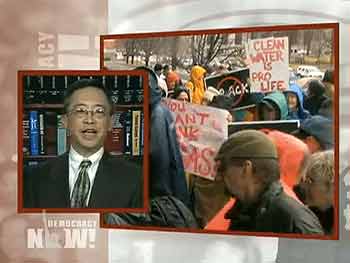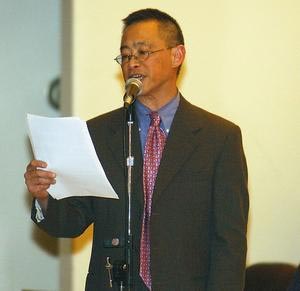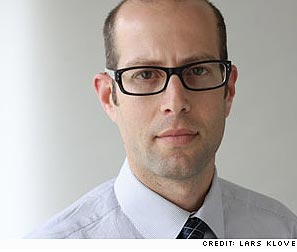Student Disrupts Government Auction of 150,000 Acres Of Wilderness For Oil & Gas Drilling.
Democracy Now reports on student action by Tim DeChristopher.
In a national broadcast exclusive, University of Utah student Tim DeChristopher explains how he bought 22,000 acres of land in an attempt to save the property from drilling. The sale had been strongly opposed by many environmental groups. Stephen Bloch of the Southern Utah Wilderness Alliance said: "This is the fire sale, the Bush administrations last great gift to the oil and gas industry. This is the first 10 minutes of the interview. For the rest go to DemocracyNow!
 For full interview click here.
For full interview click here.
See: Judge says drilling lease lawsuit too late
See: Tim DeChristopher's blog and update on his legal battle.
See: As climate crime continues, who are we sending to jail? Tim DeChristopher?
Gas drilling companies such as Halliburton say the gas drilling technique known as hydraulic fracturing, or fracking, is safe, but opponents contend it pollutes groundwater with dangerous substances.
Now, new evidence has emerged possibly linking natural gas drilling to groundwater contamination. ProPublica journalist Abrahm Lustgarten reports federal officials in Wyoming have found that at least three water wells contain chemicals used in hydraulic fracturing.
The New York-based Toxics Targeting went through the Department of Environmental Conservation’s own database of hazardous substances spills over the past thirty years.
They found 270 cases documenting fires, explosions, wastewater spills, well contamination and ecological damage related to gas drilling.
Derrick Ek. "Gas drilling concerns aired at DEC hearing," Nov 19, 2009. Corning Leader.
Ithaca environmental activist Walter Hang details a history of problems caused by the oil and gas industry in New York State.
Democracy Now! interview with Environmentalist, 350.org Founder Bill McKibben on Eaarth: Making a Life on a Tough New Planet.
Ahead of Bolivia’s indigenous summit on climate change and the expected unveiling of a Senate climate bill next week, we speak to someone who sounded one of the earliest alarms about global warming.
Twenty years ago, environmental activist Bill McKibben wrote The End of Nature, but his warnings went largely unheeded.
Now, as people are grappling with the unavoidable effects of climate change and confronting an earth that is suddenly melting, drying, acidifying, flooding and burning in unprecedented ways, Bill McKibben is out with Eaarth: Making a Life on a Tough New Planet, a new book about what we have to do to survive this brave new world. [includes rush transcript]
See:Global Warming Frequently Asked Questions
See also: Video - 350.org: Because the world needs to know.
What's the best way to introduce the world to 350?
With over 4000 languages spoken around the world, it's probably not with a bunch of words. We did our best to boil down the science of global warming and vision of the 350 Campaign in 90 seconds--and with no words.
Our focus is on the number 350—as in parts per million CO2. If we can't get below that, scientists say, the damage we're already seeing from global warming will continue and accelerate. But 350 is more than a number—it's a symbol of where we need to head as a planet.
Our theory of change is simple: if an international grassroots movement holds our leaders accountable to the latest climate science, we can start the global transformation we so desperately need.
Abrahm Lustgarten
Gas drilling companies such as Halliburton say the gas drilling technique known as hydraulic fracturing, or "fracking," is safe, but opponents contend it pollutes groundwater with dangerous substances. Now, new evidence has emerged possibly linking natural gas drilling to groundwater contamination.
ProPublica journalist Abrahm Lustgarten reports federal officials in Wyoming have found that at least three water wells contain chemicals used in hydraulic fracturing.
Abrahm Lustgarten is a former staff writer and contributor for Fortune, and has written for Salon, Esquire, the Washington Post and the New York Times since receiving his master's in journalism from Columbia University in 2003.
Democracy Now Video. Interview with Dr. Theo Colborn. April 14, 2010.
"The Environmental Protection Agency has begun a review of how the drilling process known as hydraulic fracturing, or “fracking,” can affect drinking water quality.
We speak to Dr. Theo Colborn, the president of the Endocrine Disruption Exchange and one of the foremost experts on the health and environmental effects of the toxic chemicals used in fracking." [includes rush transcript]


Efforts by lawmakers and regulators to force the federal government to better police the natural gas drilling process known as hydraulic fracturing, or "fracking," have been thwarted for the past 25 years, according to an exposé in the New York Times.
Studies by scientists at the U.S. Environmental Protection Agency on fracking have been repeatedly narrowed in scope by superiors, and important findings have been removed under pressure from the industry.
The news comes as the EPA is conducting a broad study of the risks of natural gas drilling with preliminary results scheduled to be delivered next year.
Joining us is Walter Hang, president of Toxics Targeting, a firm that tracks environmental spills and releases across the country, based in Ithaca, New York, where fracking is currently taking place. [includes rush transcript]











